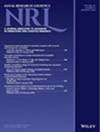混合电子商务供应链中供应商的风险规避对信息共享的影响
IF 2.1
4区 管理学
Q3 OPERATIONS RESEARCH & MANAGEMENT SCIENCE
引用次数: 0
摘要
在实践中,供应商通过在线中间商将产品销售给客户(转售),或通过中间商支付一定比例的费用直接接触客户(代理销售)。与巨型中间商不同,这些供应商的规模较小,规避风险的能力较强。受实际案例的启发,本文研究了这些中间商与其供应商进行纵向需求信息共享的动机。我们建立了一个博弈论模型,考虑了一个具有风险中性中介和两个风险规避型供应商的混合电子商务供应链,其中一个供应商(代理供应商)采用代理销售,而另一个供应商(转售供应商)采用转售。作为一个基准,我们的研究表明,如果按比例收取的费用相对较高(较低),中间商与两个风险中性的供应商共享所有(不共享)信息是有利的。然而,我们发现供应商的风险规避是导致供应链成员的定价决策受到需求信息精确度影响的关键因素。这种影响会影响双重边缘化效应,并进一步改变中间商的信息共享决策。具体来说,在弱竞争(高度竞争)的市场环境中,如果比例费用较高(中等),中间商应向规避风险的供应商披露部分而非全部信息。最后,当转售供应商对风险的敏感度相对于代理供应商对风险的敏感度足够高(低)时,我们观察到中间商分享信息的意愿较低(较高)。本文章由计算机程序翻译,如有差异,请以英文原文为准。
Impact of suppliers' risk aversions on information sharing in a hybrid E‐commerce supply chain
In practice, suppliers sell their products through online intermediaries who sell them to customers (reselling) or directly access customers via intermediaries by paying a proportional fee (agency selling). Unlike giant intermediaries, these suppliers have smaller scales and are more risk‐averse. Motivated by practical examples, this paper studies these intermediaries' incentives for vertical demand information sharing with their suppliers. We develop a game‐theoretic model to consider a hybrid e‐commerce supply chain with a risk‐neutral intermediary and two risk‐averse suppliers, where one supplier (agency supplier) adopts agency selling while the other supplier (reselling supplier) employs reselling. As a benchmark, we show that it is beneficial for the intermediary to share all (no ) information with both risk‐neutral suppliers if the proportional fee is relatively high (low). However, we find that suppliers' risk aversion is a key factor leading to supply chain members' pricing decisions being influenced by the precision of the demand information. This influence impacts the double marginalization effect and further changes the intermediary's information‐sharing decisions. Specifically, the intermediary should disclose part rather than all of its information to both risk‐averse suppliers if the proportional fee is high (intermediate) in a weakly (highly) competitive market environment. Finally, when the reselling supplier's sensitivity to risk is sufficiently high (low) relative to the agency supplier's sensitivity to risk, we observe that the intermediary is less (more) willing to share information.
求助全文
通过发布文献求助,成功后即可免费获取论文全文。
去求助
来源期刊

Naval Research Logistics
管理科学-运筹学与管理科学
CiteScore
4.20
自引率
4.30%
发文量
47
审稿时长
8 months
期刊介绍:
Submissions that are most appropriate for NRL are papers addressing modeling and analysis of problems motivated by real-world applications; major methodological advances in operations research and applied statistics; and expository or survey pieces of lasting value. Areas represented include (but are not limited to) probability, statistics, simulation, optimization, game theory, quality, scheduling, reliability, maintenance, supply chain, decision analysis, and combat models. Special issues devoted to a single topic are published occasionally, and proposals for special issues are welcomed by the Editorial Board.
 求助内容:
求助内容: 应助结果提醒方式:
应助结果提醒方式:


